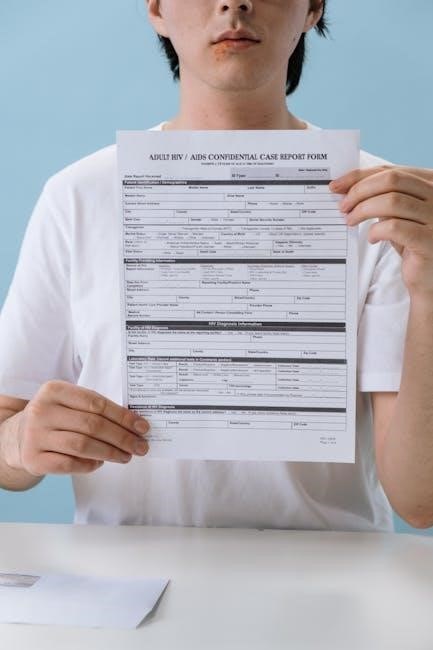The RCMP Criminal Record Check is a vital process for verifying an individual’s criminal history in Canada. It involves the use of the standardized Form C-216C, which is designed for fingerprint-based criminal record checks. This process is essential for various purposes, including employment, immigration, and volunteer opportunities, ensuring public safety and trust.
1.1 What is an RCMP Criminal Record Check?
An RCMP Criminal Record Check is a standardized process to verify an individual’s criminal history in Canada, conducted by the Royal Canadian Mounted Police. It involves the use of the C-216C form and fingerprinting to search the Canadian Police Information Centre (CPIC) database. The check reveals convictions, pending charges, and discharges, providing essential information for employment, immigration, and other purposes. It ensures accuracy and compliance with legal requirements.
1.2 Importance of the RCMP Criminal Record Check
The RCMP Criminal Record Check is crucial for verifying an individual’s criminal history, ensuring trust and safety in various sectors. It aids employers in making informed hiring decisions, especially for sensitive roles like working with children. Additionally, it is essential for immigration purposes, volunteering, and other positions requiring high levels of integrity. The check provides a reliable way to assess an individual’s suitability, fostering a secure environment and protecting vulnerable populations. Its accuracy and official nature make it indispensable for organizations seeking to maintain safety and compliance with legal standards.

The Application Process
The RCMP Criminal Record Check involves obtaining the C-216C form, submitting fingerprints, and sending the completed application to the RCMP for processing. This ensures accurate results.
2.1 Steps to Obtain an RCMP Criminal Record Check
Obtaining an RCMP Criminal Record Check involves several key steps. First, download and complete Form C-216C, ensuring accuracy. Next, get fingerprinted by an RCMP-accredited service. Attach the required documents and fees. Submit the application via mail or in-person. Processing times vary, but updates are provided. Ensure all information is correct to avoid delays. Follow guidelines carefully for a smooth process.
2.2 Required Documents for the Application
To complete the RCMP Criminal Record Check, you must provide specific documents. These include a fully completed Form C-216C, fingerprint impressions taken by an RCMP-accredited service, and payment. Additionally, you may need to submit valid government-issued identification, such as a passport or driver’s license, to verify your identity. Ensure all documents are accurate and up-to-date to avoid processing delays.
2.3 Submission Methods: In-Person vs. Mail
Applicants can submit their RCMP Criminal Record Check application either in-person or by mail. In-person submissions are processed faster, typically within 24 hours, while mail submissions may take several weeks. For in-person, visit an RCMP-accredited fingerprinting service. For mail, send the completed Form C-216C, fingerprints, and payment to the RCMP Identification Services in Ottawa. Choose the method that best suits your needs and timeline.
Understanding the RCMP Criminal Record Check Form (C-216C)
The RCMP Criminal Record Check Form (C-216C) is a standardized document for fingerprint-based checks; It’s available as a fillable PDF and must be accurately completed.
3.1 Structure and Content of the Form
The RCMP Criminal Record Check Form (C-216C) is a standardized document designed for fingerprint-based checks. It includes sections for personal information, fingerprint placement, and consent. The form is available as a fillable PDF, ensuring accuracy and convenience. Proper completion requires precise fingerprint placement and a signature, with submission to RCMP Identification Services in Ottawa. It’s essential for employment, immigration, or volunteer screening purposes;
3.2 How to Fill Out the Form Correctly
Filling out the RCMP Criminal Record Check Form (C-216C) requires attention to detail. Start by downloading the latest PDF version and ensuring compatibility with your software. Enter personal information accurately, avoiding errors. Fingerprints must be placed neatly within designated areas, following guidance from accredited agencies. Sign and date the form, then submit it along with required consent and fees. Correct completion ensures timely processing and reduces delays.

Processing Time and Fees
The average processing time for an RCMP Criminal Record Check is 3 to 6 months. Fees typically range from $25 to $50, payable via certified cheque.
4.1 Average Processing Time for the Check
The average processing time for an RCMP Criminal Record Check typically ranges from 3 to 6 months. This duration can vary depending on the volume of requests and whether manual reviews are required. Delays may occur if additional verification is needed or if the application is incomplete. Applicants are advised to submit their requests well in advance to accommodate potential delays.
4.2 Associated Costs and Payment Methods
The RCMP Criminal Record Check typically costs $25 for a basic check and $45 for a vulnerable sector check. Payments are accepted via certified cheque or money order in Canadian dollars. Additional fees may apply for accredited fingerprinting services. Applicants should verify payment methods and associated costs with the RCMP or authorized fingerprinting agencies to ensure accurate submission.
Purpose and Eligibility
The RCMP Criminal Record Check verifies an individual’s criminal history for employment, volunteering, or immigration. Eligibility includes Canadian citizens or residents requiring a background check for specific purposes.
5.1 When is an RCMP Criminal Record Check Required?
An RCMP Criminal Record Check is required for employment in sensitive roles, volunteering with vulnerable sectors, immigration, and certain professional licensing. It ensures safety and trust.
5.2 Eligibility Criteria for Applicants
To be eligible for an RCMP Criminal Record Check, applicants must provide valid government-issued ID and complete Form C-216C accurately. Individuals aged 18+ are typically eligible, though minors may require parental consent. The process requires fingerprint submission and signed consent forms, ensuring compliance with privacy laws. Proper documentation and form accuracy are essential to avoid delays.
Obtaining the RCMP Criminal Record Check Form
The RCMP Criminal Record Check Form (C-216C) can be downloaded from the official RCMP website as a fillable PDF or obtained through local police services.
6.1 Where to Find the Form (Online and Offline)
The RCMP Criminal Record Check Form (C-216C) can be downloaded as a fillable PDF from the official RCMP website. Additionally, it is available at local police stations, RCMP detachments, and accredited fingerprinting services. For online access, visit the RCMP website or authorized third-party providers offering the form. Offline, individuals can obtain it in person at police facilities or through private fingerprinting agencies that handle criminal record checks.
6.2 Ensuring the Correct Version is Used
Always download the RCMP Criminal Record Check Form (C-216C) from the official RCMP website or authorized sources to ensure you have the latest version. Check for the most recent revision date on the form. Using an outdated version may result in delays or rejection of your application. Verify the form’s authenticity by cross-referencing it with the RCMP’s official guidelines or contacting accredited fingerprinting services for assistance.

Accredited Fingerprinting Organizations
Accredited fingerprinting organizations are authorized by the RCMP to provide fingerprinting services for criminal record checks. They ensure convenience and compliance with RCMP requirements for applicants in Canada and abroad.
7.1 List of RCMP-Accredited Fingerprinting Services
RCMP-accredited fingerprinting services include organizations like C5ID, Commissionaires, and various private firms across Canada. These organizations are authorized to collect fingerprints for criminal record checks using Form C-216C. They provide digital fingerprinting services, ensuring efficient processing. Applicants can find a list of accredited providers on the RCMP website or through local law enforcement agencies, making it convenient to access services nationwide.
7.2 Role in the Application Process
Accredited fingerprinting services play a crucial role by collecting and submitting fingerprints for RCMP criminal record checks. They ensure proper handling of Form C-216C, verify identity, and digitize fingerprints for electronic submission. These services streamline the process, reduce errors, and expedite processing times, making them an essential part of the application workflow for both in-person and remote applicants.

Steps for Canadians Living Abroad
Canadians living abroad must obtain RCMP criminal record checks by submitting fingerprints using Form C-216C. Applications can be mailed or processed through accredited fingerprinting services internationally, ensuring proper authentication and consent forms are included for timely processing.
8.1 Special Requirements for International Applicants
International applicants must submit fingerprints on Form C-216C, which can be obtained from RCMP-accredited fingerprinting services. The completed form, along with signed consent and authentication, must be mailed to the RCMP in Ottawa. Additional documentation, such as a valid passport, may be required to verify identity. Processing times may vary due to international mail delays, so applicants should plan accordingly.
8.2 How to Submit the Application from Outside Canada
International applicants can submit their RCMP Criminal Record Check application by mailing the completed Form C-216C, along with certified fingerprints and required consent forms, to the RCMP in Ottawa. Ensure all documents are notarized and include a prepaid return envelope for the certificate. Processing times may be extended due to international delivery. Applicants must verify mailing instructions and requirements before submission to avoid delays.

Electronic Submission of the Form
The RCMP offers electronic submission options for Form C-216C, allowing applicants to download, complete, and send the form via email or fax for processing efficiency.
9.1 How to Submit the Form Electronically
To submit the RCMP Criminal Record Check form electronically, download the PDF version of Form C-216C from the RCMP website. Fill it out digitally, ensuring all fields are complete and accurate. Save the form and attach it to an email along with any required supporting documents. Send the email to the designated RCMP submission address for processing. This method streamlines the application process and reduces delays.
9.2 Benefits and Requirements for Electronic Submission
Electronic submission of the RCMP Criminal Record Check form offers efficiency and convenience, reducing processing times. Requirements include using the official RCMP C-216C PDF form, ensuring all fields are accurately filled, and adhering to digital submission guidelines. Applicants must also provide valid identification and consent forms. This method streamlines the process, ensuring faster turnaround and reducing the risk of errors associated with manual submissions.

Vulnerable Sector Checks
Electronic submission streamlines the process, reducing delays and errors. It requires the official RCMP C-216C form, accurate completion, and proper identification. Consent forms must also be provided. This method ensures faster processing, enhances security, and improves accuracy compared to traditional submissions, making it a reliable choice for applicants seeking efficient criminal record checks.
10.1 What Constitutes a Vulnerable Sector Check?
A Vulnerable Sector Check (VSC) is a specialized criminal record search mandated for individuals applying to work or volunteer with vulnerable populations, such as children, seniors, or people with disabilities. It includes checks for criminal convictions, outstanding charges, and certain pardoned offenses, as well as mental health records relevant to the sector. RCMP Form C-216C is required for this process, and fingerprinting is necessary. Consent is also needed to access mental health information, ensuring a thorough assessment of suitability for roles involving vulnerable individuals.
10.2 Additional Requirements for Vulnerable Sector Checks
Additional requirements for Vulnerable Sector Checks include the completion of RCMP Form C-216C and fingerprinting. Applicants must provide consent for mental health record searches, which are essential for assessing suitability to work with vulnerable populations. Proper identification and detailed personal history are also required to ensure thorough screening. These checks go beyond standard criminal record searches to protect vulnerable individuals effectively.
Accessing the Criminal Record Certificate
The RCMP criminal record certificate can be accessed online, by mail, or in-person once processed. Applicants receive a PDF version for immediate use and a physical copy by mail.
11.1 Methods to Obtain the Certificate (Online, Mail, In-Person)
The RCMP criminal record certificate can be obtained through three convenient methods: online, mail, or in-person. Online access allows immediate download of a PDF version. Mail delivery provides a physical copy sent directly to the applicant. In-person pickup is available at designated RCMP locations, ensuring secure and efficient retrieval of the document.
11.2 Verifying the Authenticity of the Certificate
To verify the authenticity of an RCMP criminal record certificate, check for official RCMP logos, watermarks, and secure digital signatures. Certificates issued electronically will have a unique identifier and can be validated through the RCMP’s online verification portal. For physical copies, contact the RCMP directly or use the provided verification methods to ensure the document is genuine and not tampered with.
Common Issues and Troubleshooting
Common issues include incomplete forms, missing fingerprints, or processing delays. Ensure all sections are filled accurately and fingerprints are legible to avoid rejections or extended wait times.
For discrepancies or delays, contact the RCMP support team or the submitting agency. Provide clear documentation and follow-up to resolve issues promptly and efficiently.
12.1 Common Errors in Form Submission
Common errors in form submission include incomplete or missing information, illegible fingerprints, and unsigned documents. Ensure all fields are filled accurately, fingerprints are clear, and signatures are included. Incorrect payment methods or insufficient fees can also delay processing. Double-check the form for any omissions before submission to avoid rejection or additional delays. Using accredited fingerprinting services can help minimize these issues and ensure compliance with RCMP requirements.
12.2 Resolving Delays or Discrepancies in the Check
To address delays or discrepancies, contact the RCMP Identification Services directly for clarification. Ensure all submitted documents are complete and accurate. Follow up on the status of your application if processing times exceed expectations. Any discrepancies in the criminal record check results should be reviewed and corrected through official channels to ensure accuracy and fairness in the process.

Disclosure of Criminal Records
Criminal records are disclosed through official RCMP channels, ensuring confidentiality and adherence to legal requirements. Consent forms are often required to share information with third parties.
13.1 How Criminal Records are Disclosed
Criminal records are disclosed securely through official RCMP channels, ensuring legal compliance and confidentiality. The RCMP releases criminal history information only to authorized parties, often requiring consent forms. Disclosure follows strict protocols to protect privacy and ensure the information is used appropriately. This process adheres to Canadian privacy laws and maintains the integrity of personal data.
13.2 Understanding the Implications of the Disclosure
The disclosure of criminal records can significantly impact an individual’s life, affecting employment opportunities, immigration status, and personal reputation. Employers and organizations may use this information to assess suitability for roles, potentially leading to exclusion from certain positions. It is crucial to handle disclosed records responsibly to avoid unfair treatment and ensure compliance with privacy laws, balancing public safety with individual rights.
The RCMP Criminal Record Check is a crucial process ensuring public safety and informed decision-making. Accurate submissions and adherence to guidelines streamline the process, yielding reliable results efficiently.
14.1 Final Checklist for a Successful Application
Ensure all sections of Form C-216C are completed accurately. Verify fingerprinting is done by an RCMP-accredited service. Attach required identification and consent forms. Double-check submission method, whether in-person, by mail, or electronically. Confirm payment and processing times. Review for any missing information to avoid delays. Ensure the correct version of the form is used to prevent rejection. Follow all guidelines carefully for a seamless process.
14.2 Importance of Following Guidelines
Adhering to the RCMP’s guidelines ensures a smooth application process, preventing delays or rejection. Properly completing Form C-216C and submitting accurate documents maintains the integrity of the criminal record check. Following instructions guarantees timely processing, allowing individuals to obtain their certificates efficiently. Compliance with requirements is crucial for the security and reliability of the system, ensuring public safety and trust in the verification process.
